

Move your mouse over the text to learn more
or click on the blue button to show videos...
Word stress, rhythm, intonation
Word stress
Syllabes in French words are, for the most part, equally stressed. English speakers tend to stress the first syllable, which is definitely unusual in French, so dry adding a light stress on the final syllable to compensate.
Rhythm
The rhythm of a French sentence is based on breaking the phrase into meaningful section, then stressing the final syllable pronounced in each section. The stress at these points is characterised by a slight rise in intonation.
French pronunciation, unlike that of English, is quite easy. The « beat » of the sentence is quite regular because of these stressed syllabes.
Intonation
A rising intonation in french is used when asking a question. There is also a rise in intonation when listing items : your voice goes up after each item until you say the final in the list, at which point your voice falls.
Liaison
French consonants at the en of a word are only pronounced when the following word begins with a vowel or a silent « h ».
This « running-on » of a sound is calling « liaison » :
« s » or « x » sounds like « z » :
« d » sounds like « t » :
Qualitative adjectives
In french, a qualitative adjective always takes the gender and number on the noun it describes (basically following the rules that apply to nouns), and usage, meaning or sound usually determine whether it goes before or after the noun :
La belle fille (the beautiful girl) ;
Pronouns
Personal pronouns are further divided as :
Adverbs
The general rule is to add « -ment » (which corresponds to the English adverb ending « -ly ») to the feminine form of the adjective :
As usual , there are some exceptions :
If an adjective ends with a vowel, use the masculine form plus « -ment » :
If an adjective ends with « -ant » or « -ent », change it to « -amment » or « -emment » respectively :
Articles
Articles are further divided as :
Word order : sentence
The word order in French is subject-verb-object :
The interrogative form
There are three ways of asking a question in French :
When the question is in the affirmative and you want to answer « yes », say « Oui ». But when the question is in the negative and you want to answer « yes », say « Si ».
Negative form
To form the negative in a sentence, place « ne... pas » around the verb. In the case of a compound tense place them around the auxiliary verb.
Others negatives : « plus », « jamais », « guère »
The passive form
Just like English, the passive form is obtained by using the declined auxiliary « être » (to be) followed by the past participle of the action verb.
Gender
Unlike in English, French nouns are either masculine or feminine, but there are unfortunately no hard and fast rules, other than usage, to help you distinguish between the two except where they clearly depend on gender :
Nonetheless, you may find it useful to know that many feminine nouns naturally end in « e » or are formed by adding an « e » to their masculine counterpart (although corollary transformations are also sometimes requiered, such as doubling the final consonant or modifying the final vowel) :
Plural
As a general rule, most nouns can be made plural simply by adding an « s » (sometimes an « x ») to their singular form (pronunciation remains the same, however, the sole indicator of their number in spoken language is the article used in front of them).
Notable exceptions are some words ending in « al » or « ail » whose plurals end in « aux » (which does change their pronunciation).
Finally, certains words remain unchanged when pluralized :
The auxiliaries
The two main French auxiliaries are « avoir » (to have) and « être » (to be), of which « voir » is the most common. They can be used alone or in conjunction with other verbs to form various compound tenses.
For examples with « Avoir » (to have):
Verbs
In french, the present tense of the indicative mode (as opposed to the conditional, the subjunctive or the imperative) only has a simple form, whereas the past and the future tenses each have a simple as well as compound forms.
Their various representations mostly derive from the infinitive, and some of them require the use of an auxiliary. Infinitive verbs have four possible endings : « er », « ir », « oir » an « re », and their present participles, or gerundives (which don't require the use of any auxiliary), all end in « ant ».
Present tense
The French present tense, called le présent or le présent de l'indicatif , is quite similar in usage to the English present tense. In French, the present tense is used to express all of the following :
The progressive form
To express (and emphasise) the present continuous, expressions such as 'en train de' or 'en cours de' may be used.
Past tense
One of the most striking differences between French and English is in verb tenses. Learning how to use the various past tenses can be very tricky, because English has several tenses which either do not exist in or do not translate literally into French - and vice versa.
During the first year of French study, every student becomes aware of the troublesome relationship between the two main past tenses.
The imperfect [je mangeais] translates to the English imperfect [I was eating] while the « passé composé » [j'ai mangé] literally translates to the English present perfect [I have eaten] but can also be translated as the English simple past [I ate] or the emphatic past [I did eat].
It is extremely important to understand the distinctions between the « passé composé » and « imparfait » in order to use them correctly and thus express past events accurately. Before you can compare them, however, be sure that you understand each tense individually...
Futur tense
Future tense endings are added directly to the infinitive.
Near futur (futur proche)
The simpliest way of expressing the future tense is to use the present tense of « aller » (« to go ») plus an infinitive. We use this in English too so you won't have any trouble remembering.
Firstly, you should learn the present tense of « aller » as it is irregular :
For example : Aller + infinitive
Imperative (Commands)
To give an order in French, just use the present tense of the verb without the subject. Commands exist only in the « tu », « vous » and « nous » forms.
With « -er », drop the final « s » of the « tu » ending :
To make a command negative, just put « ne... pas » around it :
The verb « être » has very irregular form in the imperative :
Additional
French alphabet
Learn the phonetic pronunciation of the French alphabet. Learn these in the order given. The suggested sounds are :
Most qualitative adjectives
Most qualitative adjectives can have three forms :
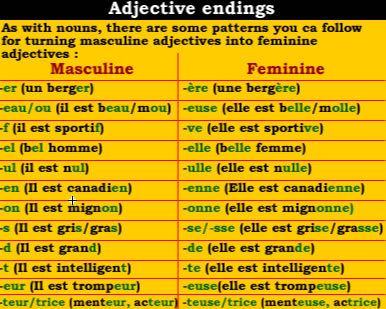
Adjective endings
Object pronouns
Possessive pronouns
Possessive pronouns, which take the gender and number of the « possession », have different forms depending on whether there is one « possessor » or more.
Reflexive pronouns (direct and indirect)
In French, « tu », « toi » and « te » are only to be used when addressing a close friend, an animate member or a child. In all other dealing, is is to be replaced by « vous » (2nd peron, plural), considered more polite and respectful.
Subject pronouns
Irregular adverbs
There are a few common irregular adverbs that must be learned :
Definite articles
Whereas there is only one definite article « the » in English, there are three in French, to be used according to the gender and number of the names they are associated with : « le » (masculine – singular), « la » (feminine – singular), and « les » (masculine/feminine – plural) : Le livre (the book) ; la voiture (the car) ; les voitures (the cars).
NOTE THAT « le » and « la » become « l' » in front of words starting with a vowel or a mute « h » : L'aéroport (the airport) ; L'exposition (the exposition) ; L'hiver (the winter)
ALSO NOTE THAT « le » and « les » respectively become « au » and « aux » when they follow the preposition « a » : Allons au (à le) festival) (Let's go to the festival) ; Service aux (à les) tables (table service)
AND BECOM « du » and « des » when they follow the preposition « de » : Le capitaine du (de le) bateau (the ship's captain) ; L'horaire des (de les) trains (the train schedule).
Indefinite articles
Concurrently, there are three indefinite articles, also to be used according to the gender and number of the names they are associated with :
Note that, unlike in English, the indefinite article is required in front of a plural noun.
Partitive articles
French also two partitive articles to distinguish the part from the whole, or things that cannot be counted : «du» (masculine – singular), «de la» (feminine – singular) :
Question words
As for exceptions, they are numerous...
For example :
the feminine of nouns ending in « eau » ends in « elle » :
The feminine of nouns ending in « f » ends in « ve » :
The feminine of most nouns ending « x » ends in « se » :
As for exceptions, they are numerous...
For example :
The feminine of nouns ending in « teur » ends either in « teuse » or « trice » :
The feminine of most other nouns ending in « eur » ends in « euse » :
And the feminine of many other nouns in completely different :
Plural : unpredicable rules
While others follow unpredicable rules :
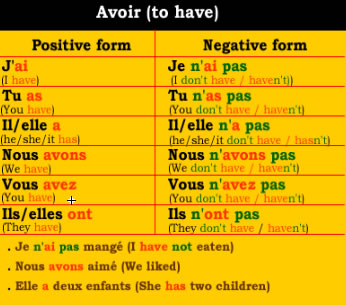
Avoir (To have)
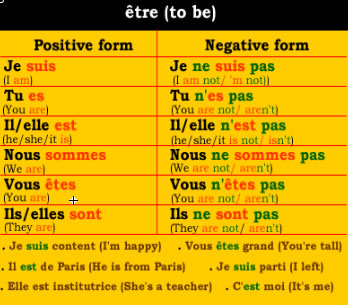
être (To be)
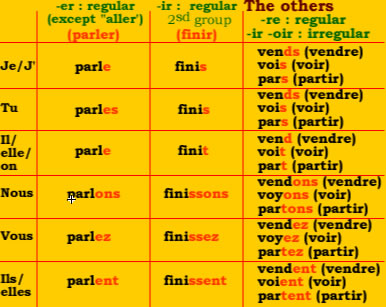
The present tense
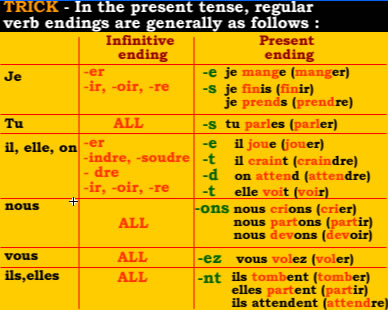
TRICK : The present tense
Imperfect tense (Imparfait)
The most usual simple form of the past tense is the imperfect which indicates an habitual or ongoing action in the past.
For example :
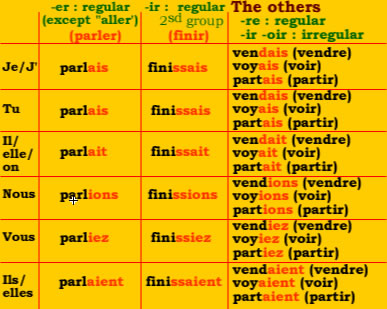
Conjugation : Imperfect tense (Imparfait)
Perfect tense (compound form)
The most usual compound form is the « perfect tense », which indicates an action completed in the past.
It is obtained by using a declined auxiliary (« to have » or « to be ») follow by the past participle of the action verb (which varies depending on the infinitive ending but remains unchanged throug all persons).
For example :
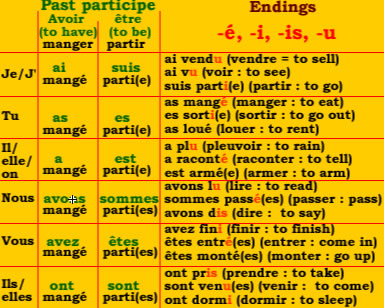
Conjugation : Perfect tense (compound form)
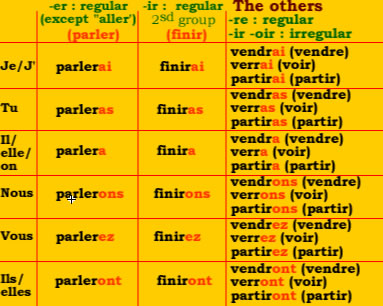
Conjugation : the futur
Prepositions
Other useful prepositions
Ordinal number
Questions
Words and expressions
Questions
Conjunctions
Conjunctions link things in a sentence. These things could be nouns, phrases or clauses.

Funny song
Frog Invaders - Excuse My French

Tips on Learning French...
Some thoughts about the French language and how to learn it.

Verb to be (verbe être) : present tense.

Verb to have (verbe avoir) : present tense.

French Present Tense : le présent.

Learn French Compound Past Tense : Le Passé Composé

Past Participle Agreement in French

Imperfect Tense in French : l'imparfait.

The French Future Tense

The Near Future : Le futur proche.

The Imperative Mood - L'Impératif.

The conditional Mood in french

Learn French subjunctive -
Part 1

Learn French subjunctive -
Part 2

French Possessive Adjectives.

Demonstrative Adjectives in French.

Definite Article.

De, Du, De la, Des in French : partitif or indefinite articles.

French Verbs with Prepositions - Part I (VERB + à).

French Verbs with Prepositions - Part I (VERB + de).

French Pronouns : Object Pronouns (direct or indirect).

Learn French - Pronouns Y and En - Les pronoms Y et EN.

French Relative Pronouns Lequel, Dont.

French Relative Pronouns Qui, Que in French.

adjectives in French, French adjectives rules.

The Superlative - How To Form The Superlative In French - Le superlatif.

The Comparative - How To Make Comparisons In French - Le comparatif.

Learn French - Adverbs - Les adverbes.

Adverbs (part 2) - How To Form Adverbs In French - Les adverbes.

Robin Williams - The French

Rien à signaler.

Rien à signaler.

Rien à signaler.

Rien à signaler.

Rien à signaler.
Bon voyage ! |